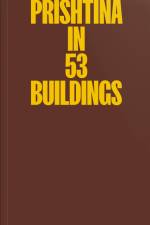av Donika Luzhnica
285,-
"Prishtina in 53 Buildings" draws a multifaceted portrait of Kosovo's capital city by using architecture as a prism to understand political, cultural and economic processes. Essays on fifty-three built structures, written by different authors with different geographical background and different professional perspective, add up to multilayered account of the city's history and present. The texts include architectural analyses, political reflections, ethnographic observations and personal memories. Taken together, however, they allow for an understanding of the ambiguous and conflicting processes that are propelling urban development not only in Prishtina. The texts are supplemented by pictures and a visual essay by Italian photographer Filippo Romano."Prishtina in 53 Buildings" is more than a guide book for visitors or residents of the city. Buildings are not only the materialization of design principles or architectonic ideas, but the outcome of socio-economic processes. The built environment is constantly re-appropriated, re-interpreted and re-valuated as architects do not have the final say as to the meaning and the function of an edifice. By conceptualizing architecture as materialization of societal processes, "Prishtina in 53 Buildings" pushes beyond notions that assume an intrinsic and coherent 'logic' of cities. The editors Donika Luzhnica and Jonas König show that a polyphonic approach is more apposite to depict the often-contradictory trajectories of urban development. What holds true for cities in general, is in particular applicable for post-conflict cities like Prishtina. EditorsDonika Luzhnica is an architect based in Zurich and Prishtina, where she co-founded Ars Atelie. Her award-winning research on the reactivation of Gërmia, a former department store in Prishtina, was featured at Architecture Biennale 2021 in Venice. She was a guest editor of a special feature of the German architecture magazine Bauwelt on Prishtina's urban development and architecture. She currently works with CH Architekten in Zurich. Jonas König is a researcher at the Institute of Urban and Regional Planning at Technical University Berlin. He was a guest editor of two special features of the architecture magazine Bauwelt on architecture in Albania (2019) and Prishtina (2022) and has published in journals such as City, Kajet, Monu, and dérive on urban development issues in Southeast Europe.PhotographerFilippo Romano is a documentary and architecture photographer. Filippo Romano's work has been exhibited internationally, among others, at the Biennale of Architecture in Venice 2010 and 2021. Also, he has published several books and has been featured in media outlets such as Abitare, Dwell, Domus, Io Donna, Courrier International, Huffington Post, and Newsweek. ContributorsThe book contains contributions by Alba Imeri, Ana Dragic, Andrra, Anna Di Lellio, Antigonë Isufi, Antonia Young, Arbër Sadiki, Arnisa Kryeziu, Arta Basha Jakupi, Aurela Kadriu, Bardhi Haliti, Besa Luci, Carlo Ratti, Daniele Belleri, Dion Zeqiri, Donika Luzhnica, Eliza Hoxha, Ena Kukic, Erodita Qehaja, Erzë Dinarama, Fitore Isufi Shukriu, Flaka Haliti, Flakë Zeneli, Gil Boesch, Gjergji Islami, Gresa Kastrati, Guillaume de Morsier, Gyler Mydyti, Ilir Bajri, Ilir Gjinolli, Iliriana Sejdullahu, Ines Demiri, Jean-Arnault Dérens, Jeton Neziraj, Jonas König, Kai Vöckler, Krenare Juniku, Lydra Hoxha, Martin Pohl, Maximilian Hartmuth, Mirjeta Qehaja, Nebojsa Milikic, Nick Ames, Nita Deda, Nora Krasniqi Arapi, Predrag Guberinic, Rozafa Basha, Ruth Duma Coman, Sakibe Jashari, Sali Spahiu, Samir Karahoda, Shkumbin Ahmetxhekaj, Shpresa Jashari, Sokol Beqiri, Sokol Ferizi, Toton, Valentin Kuník, Visar Geci and Vladimir Kulic.

